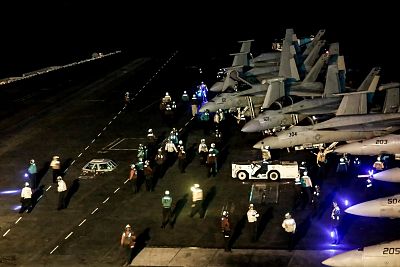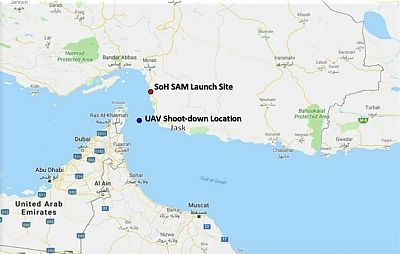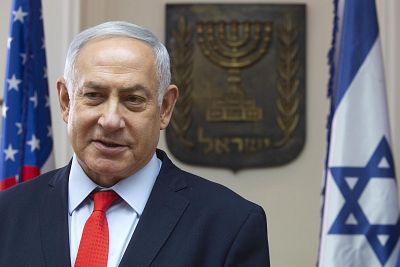Washington's envoy on Iran, Brian Hook, said Friday it was "important we do everything we can to de-escalate."
LONDON — Urgent calls for calm followed President Donald Trump's decision to call off retaliatory strikes on Iranian targets, but all sides continued to point the finger at one another Friday for ratcheting up the pressure.
Speaking to reporters during a visit to Saudi Arabia, Washington's envoy on Iran, Brian Hook, said Friday that it was "important we do everything we can to de-escalate."
But he also blamed Iran for dialing up tensions.
"Our diplomacy does not give Iran the right to respond with military force," he said. "Iran needs to meet our diplomacy with diplomacy and not military force."
Trump confirmed on Friday that he had been "cocked and loaded" to strike Iranian targets but deemed that the loss of life would be disproportionate to the downing of an unmanned U.S. drone.
In an exclusive interview with NBC's Chuck Todd for "Meet the Press," Trump was asked if planes were in the air and the president responded, "No, but they would have been pretty soon, and things would have happened to a point where you would not turn back, you could not turn back."
"Nothing was green lighted until the very end because things change," Trump said during the interview with Todd.
The drone strike and the aborted decision to strike Iranian targets followed weeks of rising tension and attacks on two oil tankers in the Gulf last week. The developments are underpinned by a deep mutual mistrust between the nations, as well as U.S. criticism of Iran's nuclear and ballistic missile activities and support for proxies in various Middle East conflicts.
In Tehran, Iranian Foreign Minister Mohammad Javad Zarif laid the blame for escalating tensions in the region firmly at Washington's door.
"The U.S. wages #EconomicTerrorism on Iran, has conducted covert action against us & now encroaches on our territory," he tweeted Thursday. "We don't seek war, but will zealously defend our skies, land & waters."
Iran's ambassador to the U.N. defended downing the drone Friday and said Tehran would not be forced back into negotiations with the White House. "You cannot negotiate with somebody who has a knife in his hand, putting the knife under our throat," Majid Takht Ravanchi told NPR.
The Trump administration hopes stringent economic sanctions will force Iran to the negotiating table. So far this approach has failed. On Monday, Iran announced it will breach the curbs on its stock of low-enriched uranium that it agreed to in the landmark 2015 nuclear agreement, designed to reign in its nuclear program.
Trump has said he is not eager to escalate a stand-off with Iran over its downing of the U.S. drone on Thursday. He said the drone may have been shot down in error by someone who was acting "loose and stupid."
A senior official from Iran's Islamic Revolutionary Guard Corps claimed Friday that several warnings were issued before the U.S. surveillance drone was downed.
"We have had two stages of warnings," Cmdr. Amir Ali Hajizadeh said on state television. "They did not respond." American officials did not respond to a request for comment on the Iranian claims.
The aircraft was shot down after the last warning at 3:55 a.m. Thursday (7:25 p.m. ET Wednesday), Hajizadeh said.
Speaking before Iran shot down the drone on Thursday, analysts said Tehran could be persuaded to step back from its threats. But for Wendy Sherman, the former undersecretary of state for political affairs who led the U.S. team that negotiated the Iran nuclear deal, it is up to the U.S. to make the first move.
"Iran will not negotiate unless the U.S. puts something on the table. It is a culture of resistance. They lived through the 12-year Iran-Iraq war, they know hardship," she said.
But after Iran shot down the U.S. drone, the chances of a breakthrough seemed even more distant.
Speaking at a roundtable event in London Thursday, Adel al-Jubeir, the Saudi minister for foreign affairs, defended the U.S.'s "maximum pressure" campaign on Iran.
"The world tried for 40 years to reason with Iran, and it got us nowhere," he said. "This idea of 'We should reach out to the Iranians' failed."
Like other nations currently swept up in the rising tensions, al-Jubeir said Saudi Arabia did not seek war with Iran, while also saying it was up to Tehran to change.
"I don't think anyone wants war, but the Iranians have to recognize that their aggressive behavior cannot continue indefinitely — there has to come a point where they stop," he said.
In Israel, Prime Minister Benjamin Netanyahu reaffirmed his solidarity with the U.S.
Speaking at a reception for the New England Patriots on Thursday, Netanyahu called on "all nations that desire peace and security to support the United States in its efforts against Iranian aggression."
But Hesameddin Ashena, an adviser to Iranian President Hassan Rouhani, called on Trump Friday to ease sanctions.
"Today's crisis stems from Washington's withdrawal from JCPOA, and obstructing real diplomatic overtures," he said on Twitter, referring to the 2015 Iran nuclear deal. "But this process is reversible. Every tangible constructive step will be met in kind."














